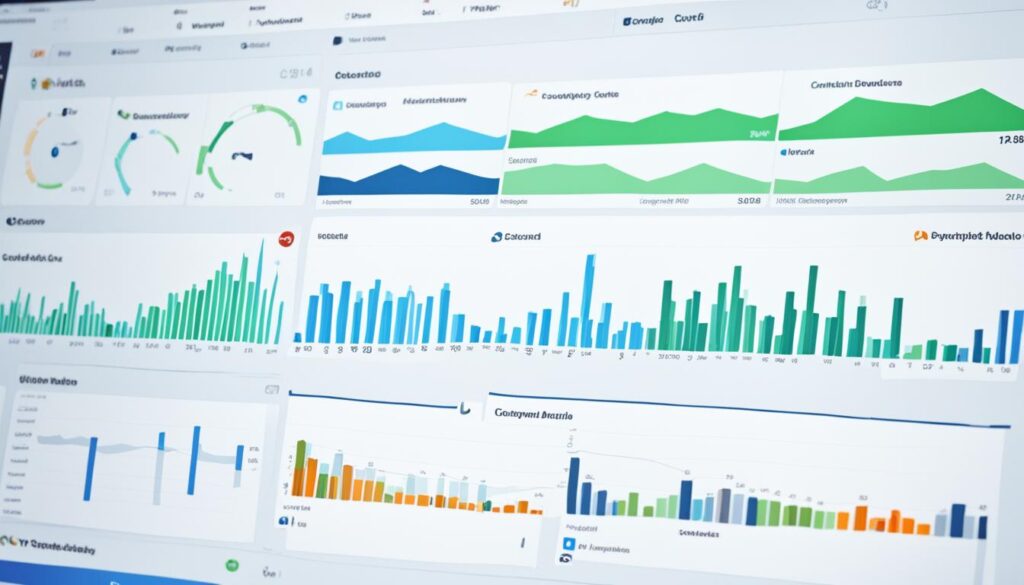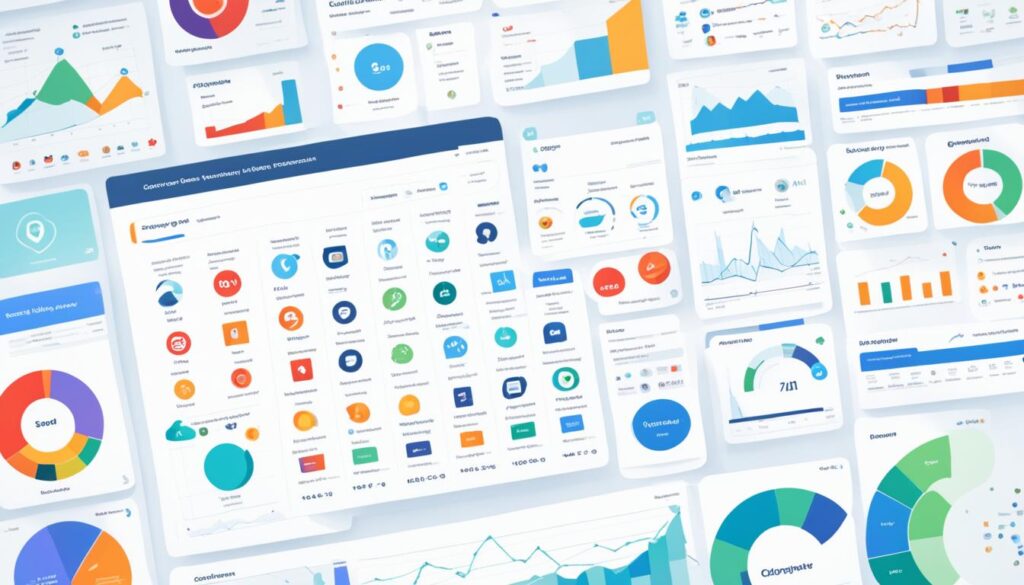Is online reputation important for businesses today? Absolutely. Social media is used by 4.76 billion people, making it key for brands to connect with their audience1. But, it’s not simple. A single bad comment or viral post can hurt a company’s name forever. This is why social media reputation management is critical. It’s about making sure your online image matches your brand’s values and message well.
To manage your reputation on social media, you must keep an eye on what’s being said about you. This means staying on top of customer feedback, posting positive content, and taking down bad comments. 51% of people believe brands are most memorable when they reply on social media2. Also, 76% always read online reviews, and 46% trust them like they trust friends’ advice2. This shows why managing your social media reputation is so important.
Consumers follow brands on social media mostly to learn about new stuff and to get quick responses to their needs2. 76% say fast responses from brands matter to them2. This means engaging with customers on social media builds trust and loyalty. In fact, a good online reputation can affect a company’s worth by up to 63%31. So, managing your reputation well on these platforms directly helps your business.
Key Takeaways
- Social media reputation management is crucial for businesses to control their online presence and protect their brand image.
- Responding to customer feedback on social media can make brands more memorable and trustworthy to consumers.
- Online reviews heavily influence consumer purchasing decisions and perception of a brand’s reliability.
- Quick response times and active engagement on social media platforms contribute to building customer trust and loyalty.
- A strong online reputation directly impacts a company’s market value and overall success.
The Importance of Social Media Reputation Management
In our digital world, managing how people see your brand on social media is key. Nearly 60 percent of the world uses social media4. So, connecting with customers there is a must. By quickly answering questions and feedback, brands build trust. They stand out from the competition. More than half of consumers think companies are more memorable when they respond on social media2.
A good online image not only brings in new buyers but boosts sales too. Some 80 percent say social media affects what they buy4. Also, products with around 40 reviews are seen as more reliable4. And when looking for local services, 76% read reviews2. About half the people think online reviews are as good as personal tips2. These numbers show why it’s key to be active on social media and keep your brand’s image positive.
Taking care of your online image also helps in hiring and keeping top talents. Job seekers check a company’s online rep before saying yes. So, it’s important for businesses to spotlight their values and thoughts on social media. Being active there helps companies lure top talents and make a good work atmosphere.
“Social media visibility and engagement can lead to increased sales and brand credibility.”4
Social media is not just for boosting loyalty or sales. It’s also crucial in handling trouble. Bad reviews or comments can take a toll on a brand’s image and sales. By keeping track of what people say online and quickly sorting out issues, you can limit the harm from bad feedback. 68% follow brands on social media to learn about new things2. This shows the need for open, regular talks.
- 76% of consumers value how quickly a brand can respond to their needs2
- 69% of consumers expect responses from brands on social within 24 hours or less2
- Engaging customers on social media platforms like Instagram and TikTok can improve trust and loyalty levels4
- Brands that are transparent and engage with customers on social media often have better reputations4
| Social Media Platform | Impact on Brand Reputation |
|---|---|
| Increased brand awareness and customer engagement | |
| Visual storytelling and influencer partnerships | |
| Real-time customer service and crisis management | |
| Thought leadership and industry expertise |
Using social media wisely is a great way to shape your brand’s image and make customers happy. It’s necessary for success in today’s tough market.
Assessing Your Current Online Reputation
Starting to manage our online reputation, we need to know where we stand online. In 2024, every post on social media matters a lot for how people see a brand5. Twitter, Facebook, and Instagram have a big impact on what people think of a brand online5. It’s key to do a deep dive into our social media and overall online image to see clearly where we are.

Looking at brand mentions, stats from social media, and how people feel about your brand gives us insights. A whopping 90% of shoppers trust online reviews above all when they make a purchase6. Also, 84% check out reviews online before buying something6. This shows the huge value of keeping track of what people are saying online.
We can use tools like SocialBee, Brand24, and NiceJob to help manage what people see about our brand online5. These tools let us watch how people interact with us, which posts are popular, and how our audience grows. They paint a clear picture of our brand’s online health.
Staying on top of our online image can boost our earnings6. By investing in our brand’s image and online presence, we can build stronger connections with customers. This can lead to more trust, loyalty, and profit for us6.
When we look at our online rep, we should do these key things:
- Checking our social media and what people say about us.
- Setting up Google Alerts to watch for mentions of us or our important products.
- Using data to track and improve how we look online.
- Looking at the numbers from our social media and website to see what’s working and what’s not5.
For credit unions, what people say about them online really matters. More and more, current and new members look online to check they’re trustworthy and offer good service7. Good reviews can bring in new members, but bad reviews might keep them away7. A positive online image helps keep members happy and involved longer7.
An in-depth look at our current online image shows us what we’re doing right, what needs work, and where to focus. This is the first step in creating a plan that shows our brand at its best to our target audience.
Developing a Social Media Reputation Management Strategy
Building a strong online presence for your brand needs thought and smart decisions. A good online rep is key to winning customers’ trust, boosting your brand’s name, and growing a strong followship.
To make a good social media rep plan, think about these main points:
- Define your core values: Keep showing your brand’s heart online. Use words and images that match your beliefs. How you talk to people should show you believe in these values too.
- Understand your audience: Do surveys, keep an eye on talks on social media, and talk right to your followers. With over 4.76 billion folks on social media, knowing your audience is vital for managing your rep well.
- Establish clear reputation objectives: Figure out what you want your online rep to look like. For instance, maybe you want a 90% thumbs-up from users on your customer service by next year.
- Maintain a consistent brand voice: Make sure your messages, how you talk, and what you share all fit together. This makes your brand stand out and easier to remember.
- Promote your unique selling points: Talk up what’s special about your brand, whether it’s top-notch products, great care for customers, or speedy delivery. Make these the star of your social media posts.

Creating a social media policy is a must for reputation management. It should cover how your team uses social media, how to handle customer questions or complaints online, and what to do in a crisis. Check out tools like SocialBee and Brand24 to keep track of what’s being said, manage reviews, and plan your posts. This proactive strategy is key for online rep management5.
Keep an eye on your social media rep and always aim to do better. Watch how your brand is talked about, read what customers say, and keep an eye on your competition. Use rep scores to track your improvement. Team up with influencers and run campaigns with content made by users to make the good vibes about your brand louder. More than 2,000 big shots say 63% of their brand’s worth comes from their online rep. And nearly every shopper says online reviews sway their buy choices3. So, it’s super important to always work on your rep.
By setting up a solid plan for social media reputation management, you take control of how your brand appears online. This helps build trust with your tribe and leads to lasting success in the digital world.
Choosing the Right Social Media Platforms for Your Business
Do you want to boost your brand’s online image and reach more people? There are over 3 billion users on social media worldwide8. Choosing the best platforms is essential. It’s like dancing. You show your unique style and connect with others on different platforms.
Think about your audience’s age, what content they like, and your brand’s style. Look at what your competitors do. Then, pick platforms that fit your goals9.

Facebook is great with almost 3 billion people visiting every month. It’s perfect for reaching many users, sharing interesting content, and using ads8. Facebook’s many features and SEO can help any kind of business.
If you’re into networking and being a leader in your field, check out LinkedIn and X, which used to be Twitter. LinkedIn has 900 million users for building relationships and sharing news8. X, formerly Twitter, with 330 million users, is good for quick chats and watching your brand’s image online10.
For those who love visuals, platforms like Instagram, TikTok, and YouTube are perfect. They’re great for fashion, food, travel, and more8. YouTube alone has 2.68 billion monthly users. You can showcase your work and bring users to your site8.
Choosing the right social media platforms is like finding the perfect dance partner. It’s all about compatibility, rhythm, and making a lasting impression on your audience.
Don’t just post. Also, use the right tags and work with influencers. Ads can help too10. Always check how you’re doing and adjust to reach your audience better.
Keep up with social media changes and tell your story across all platforms. With the right platforms and a smart strategy, your brand can grab attention and keep followers engaged.Also, remember life.
| Platform | Key Features | Ideal For |
|---|---|---|
| Wide reach, diverse targeting options, SEO benefits | Brand awareness, customer engagement, paid advertising | |
| Professional networking, thought leadership | B2B businesses, lead generation, industry insights | |
| X, formerly Twitter | Real-time interactions, brand monitoring | Customer service, competitor analysis, trending topics |
| Visual content, storytelling, influencer partnerships | Fashion, food, travel, lifestyle brands | |
| TikTok | Short-form video content, viral trends | Creative brands, younger audience, entertainment |
| YouTube | Long-form video content, tutorials, product demonstrations | Education, how-to guides, brand storytelling |
By carefully choosing the right social media platforms, you can strengthen your online presence. This builds trust with your audience and boosts your business in the digital world.
Best Practices for Social Media Reputation Management
In today’s world, it’s key to handle our online image well with so many people on social media11. We need to keep an eye on what’s being said and respond quickly. By doing so, we can build a positive relationship with our followers.
It’s crucial to talk professionally and clearly online. When customers ask questions or raise concerns, reply quickly and show you care. A big part of making a good impression on social media is being there for customers when they need you the most.
Sharing helpful content and participating in industry discussions can make us a go-to source for information. It also increases trust with our followers. When our own employees support and share content, it boosts our brand’s trustworthiness even more.
Most people expect brands to get back to them in less than a day online, and a quick response means a lot to them2.
To make sure we do well in managing our online reputation, we should have a plan in place. This means deciding how employees should act on social media, getting ready for possible bad situations, keeping an eye on what people say about us, and working with others to share good news.
We must always work on being better online. By keeping up with the latest strategies and checking how we’re doing, our brand can grow stronger. Facebook and Instagram are huge, bringing us chances to connect with lots of people.
| Platform | Monthly Active Users | Reputation Management Strategy |
|---|---|---|
| 2.989 billion | Engage with customer comments and messages, share behind-the-scenes content | |
| 2.35 billion | Showcase visually appealing product images, collaborate with influencers | |
| X (formerly Twitter) | 330 million | Monitor brand mentions, respond to customer inquiries, share real-time updates |
| 900 million | Publish thought leadership content, engage with industry discussions |
By making managing our social media reputation top priority and using these best practices, we can make our online presence thrive. This not only keeps our customers happy but also sets us up for success in the digital world.
Engaging with Your Social Media Community
Engaging with your social media community helps build strong relationships and brand loyalty. It’s key to interact and provide great service. A study found that 51% of consumers think brands that reply on social media are the most memorable2. This shows the need for quick and personal responses to all kinds of messages.
Being proactive in managing your community is important for your brand’s image. Keeping an eye on your brand and relevant topics can lead to better engagement. This starts with around 2 responses daily, then you can see what works as you go along12.
Dealing with negative feedback is a must in managing your brand’s image. It’s important to keep a professional and caring tone when replying to bad feedback. Offer solutions and try to take the conversation private if needed. By doing this, you can turn bad experiences into good ones and make customers more loyal.
“We believe that every social media interaction is an opportunity to showcase our commitment to our customers. By actively engaging with our community, we not only build stronger relationships but also demonstrate our dedication to providing exceptional service.”
Encouraging your followers to share their own content is very impactful. By highlighting their experiences and positive reviews, you create a feeling of belonging. This not only helps promote your brand but also shows others that people love your products or services.
Being quick in your responses is very important, as 69% of people expect an answer within 24 hours2. Try to be on the lookout for messages throughout the day. This will help you respond faster and keep your community happy12.
- Personalize every response to show you care about each person
- Always thank your followers sincerely after each interaction
- For private or delicate matters, move the conversation to a private channel
Engaging on social media is more than just replying to messages. To build real connections, think about:
- Organizing fun contests and giveaways to get people excited
- Collaborating with influencers to reach more people
- Hosting live events or Q&As to offer value and connect in real-time
- Showing your gratitude for your customers’ support often
By focusing on community engagement, brands can really improve their online reputation12. Putting in the effort to nurture relationships pays off, making customers more loyal and ensuring success over time.
Leveraging Social Media Reputation Management Tools
In today’s world, where what we say online can greatly impact a brand, using social media tools to manage reputation is key5. These tools help keep track of what people are saying about your business. They allow you to see when your brand is mentioned or used in @-mentions. It’s important for handling questions, concerns, or any praises5. Sprout Social is a great choice for this because it provides monitoring and management for all social media activities.

Sprout Social offers a way to see all your social messages in one place. This helps you follow and reply to mentions across different social platforms. You can also share your dashboard with your team to improve your response speed. Responding quickly is crucial because a fast reply matters to 76% of customers. Plus, 69% expect a brand to answer them on social media within a day13.
Gauging the health of your social reputation by hand is tough. This is why tools like Sprout Social are valuable. They provide insights using analytics and sentiment analysis. For instance, these tools can turn mentions into a measure that you can track. Tracking this helps you know if you’re improving. The platform also shows how customer sentiment changes over time, saving you from sorting through comments one by one.
Listening to social chatter and watching your competitors are crucial for managing your online reputation well. By keeping an eye on what people say about your brand and your competitors, you can make decisions that keep you ahead.
With Sprout Social, managing your social reviews from everywhere is simple. This tool gathers all reviews in one place. It lets you see an overview of your reputation easily. Plus, with auto-response and instant alerts, you can quickly handle any feedback or opportunities for improvement.
| Tool | Key Features | Benefits |
|---|---|---|
| SocialBee | AI-powered social media management, key metrics (engagement rate, reach, top-performing posts, best posting times, audience growth) | Effective online reputation management, data-driven insights |
| Brand24 | Real-time monitoring, sentiment analysis, influence scoring, automated reports | Comprehensive brand monitoring, crisis prevention |
| NiceJob | Review management, customer surveys, review marketing campaigns | Boosting positive reviews, improving customer satisfaction |
Tools like Sprout Social, SocialBee, Brand24, and NiceJob can really help. They improve your work, give you deeper info, and support smart decisions5. With tools that bring all platforms together, schedule content, allow teamwork, and give AI insights, you can shape how your brand is seen. This helps you build stronger bonds with your audience.
Using social media management tools saves time and helps you track your success. It lets you see clear data and understand the value of your efforts. Incorporating these tools in your plan helps create a trustworthy image online. This trust leads to loyalty and success for your business13.
Conclusion
In today’s world, managing how your company looks on social media is a top priority. It helps businesses be strong online and keep a good image. Platforms like Facebook, Twitter, Instagram, and LinkedIn have billions of users. They really influence what people think about brands14. By watching social media closely, interacting with followers, creating real and positive posts, and using tools to manage reputation, companies can control how they’re seen. This builds trust with customers15.
A strong plan for managing your brand’s social media reputation means always using the same brand message on all platforms. You need to think strategically and follow certain rules. One key part is quickly answering questions or feedback from customers and being honest in tough times. It’s also about creating a feeling of community through real conversations. Big brands like United Airlines, Apple, and Starbucks have learned the hard way about the importance of taking quick and smart actions when their online image is at risk14.
Having a great social media name can make a business stand out, keep customers coming back, and even get them to spread the word. Adding social media to overall reputation management and using tools like Brandwatch, Mention, and Hootsuite makes a brand more trusted, more credible, and boosts its general reputation1514. Since social media is a big part of our lives, it’s crucial to be always alert, true to ourselves, and focus on what our audience needs to succeed in the digital world.
FAQ
What is social media reputation management?
Why is social media reputation management important for businesses?
How can I assess my brand’s current online reputation?
What should I include in my social media reputation management strategy?
How do I choose the right social media platforms for my business?
What are some best practices for managing social media reputation?
How can I effectively engage with my social media community?
What tools can I use for social media reputation management?
Source Links
- https://thriveagency.com/digital-marketing-services/social-media-reputation-management/
- https://sproutsocial.com/insights/social-media-reputation-management/
- https://blog.hootsuite.com/social-media-reputation-management/
- https://www.vendasta.com/blog/social-media-reputation-management/
- https://socialbee.com/blog/social-media-reputation-management/
- https://www.forbes.com/sites/forbesbusinesscouncil/2023/12/27/how-to-evaluate-and-manage-your-online-reputation/
- https://www.memberxp.com/your-guide-to-credit-union-online-reputation-management-monitoring/
- https://webfeatcomplete.com/blog/social-platforms-for-business/
- https://aventigroup.com/blog/6-tips-for-choosing-the-right-social-media-platform-for-your-business/
- https://sproutsocial.com/insights/social-media-channels/
- https://www.sprinklr.com/cxm/social-media-reputation-management/
- https://wearesculpt.com/blog/proactive-engagement-social-media-community-management/
- https://www.janbaskdigitaldesign.com/blogs/social-media-for-online-reputation-management/
- https://consultusdigital.com/blog/role-of-social-media-reputation-management/
- https://www.linkedin.com/pulse/importance-social-media-online-reputation-management-pushpak-vyas

